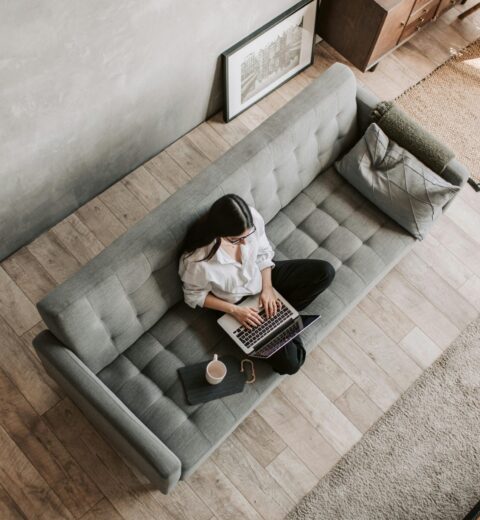The Impact Hub’s Global Network :: An Interview with Shazia Mirza @ Impact Hub Westminster
Week 30 – London. Welcome back to the Workplace series! Today we are presenting Impact Hub Westminster and the Impact Hub Network; a network of collaborators focused on making a positive impact in our world. Through this interview, Managing Director of Impact Hub Westminster, Shazia Mirza, is telling us all about this global concept.

When and how did you start Impact Hub Westminster?
Impact Hub Westminster was founded by Westminster City Council, Architecture 00 and Simon Kirkham in April 2011. They began renovating an empty first floor of New Zealand House on Haymarket, and just 6 months later, Impact Hub Westminster opened its doors. It now provides open plan workspace for over 300 members, a host of business support programmes and space for some awesome events.
How did you grow the business?
Organic growth has been important to our business. After attracting an initial community of entrepreneurs, freelancers and small businesses, our members showed their passion for the project, inviting their partners, customers and friends to join them. This created a supportive, collaborative ecosystem for those looking to create a positive impact.

Can you please tell us a bit more about the Hub Network?
When we started we were one of just 20 Hubs around the world. Since then, the movement has expanded on a global scale, with over 80 Impact Hubs and 15,000 members. All of the hubs have a common purpose of taking localised action to create a global impact.
The global aspect is important to many of our members, who get to use the Hub Passport to work at other Hub’s across the world. This gives them a chance to experience the unique spirit of each Hub and to connect with the global network.
Do you consider yourself a property player or service provider?
We are very much a service provider! We provide physical space and vital business services, but our activities extend far, far beyond this. Our mission is to empower a community of entrepreneurs, startups and small businesses who are using their skills to make a positive impact.
We encourage collaboration and connections through our community events, run support programmes to help businesses to launch and scale – and help to enhance their impact.
For example, we’re currently running a programme to improve leadership skills; a series of events examining Brexit’s impact on the Sustainable Development Goals; and a series of workshops around crowdfunding for your startup.

How do you differentiate from your competitors?
We are more than a coworking space. We see ourselves as part business incubator, part campus and part innovation lab. We believe a better world takes shape when creative, committed, and compassionate people come together for a common purpose. That’s why our environment and services are tailored to support this.
Can you please describe the environment/interior and the main design elements?
We’re very lucky to be housed within New Zealand House, in an open-plan space filled with natural light, with beautiful views of Pall Mall and Trafalgar Square. Our space reflects our values of transparency, collaboration and community, with OpenDesks, glass meeting rooms – and our combination of hot desking and dedicated team desks.
Our latest addition is our member’s café, serving ethically sourced, organic food and drink. The café area is the heart of the space, with comfortable sofas, soft furnishings and warm lighting. This creates a cosy area to escape to for an informal meeting or relaxing break.

Do you brand your space or do you let your members brand their spaces?
We provide opportunities for our members to brand their desks, so they have a sense of ownership of the space. We also have our own branding throughout the space, to express our values.
What are the main changes in the way occupiers/members have used office space in the last 5-10 years?
We have been running for under 10 years, but we have noticed a higher demand for small businesses looking for the flexibility we offer. They enjoy having a fixed base as a team, but different membership options for individuals who may work remotely or spend lots of time out of the office. We have also noticed that many business owners, especially at an early stage, really want networking opportunities – and spaces like this provide regular opportunities to meet and work alongside other businesses.

What technology have you installed in, how are your clients/members using it?
We use a cloud based platform that enables members to connect with the community, share updates and create an online profile. They can also use this for the practical aspects of their membership, such as booking meeting rooms or planning events. We understand how busy it can be when you are running or working for an early-stage business, so we have made everything simple to use and access.
From which sectors are your typical members?
Our members come from eclectic backgrounds, but they are united in their mission to use business as a vehicle for change.
We have government thinktanks, global development charities, e-commerce and web design organisations, to name a few! Basically, there is no set mould for the companies that work here.
One of the benefits of this is that our members often use each other’s services, collaborate on projects and host joint events. It’s brilliant to see people with different skills and areas of expertise working together.

How do you manage the community?
We use an online platform to manage the community, but we also have a Head of Community and Programmes to bring everyone together.
Our focus meetings are also a great opportunity to open a dialogue with our members. This gives us a chance to listen to their feedback, and make updates based upon this.
How do you see the importance of social responsibilities for today’s businesses?
We find that many businesses are keen to be more responsible, whether it be in their hiring processes, supply chains or giving back to the community. At the end of the day, it is in business owners’ best interests to run a sustainable and ethical business. This doesn’t mean all business should be non-profit of course, but all businesses should be aware of the decisions they make and their impact.

What are the main challenges and opportunities ahead?
The main challenge is to continue providing affordable space in such a premium location. With our own costs rising, we are working hard to stay true to our vision and values. But, we still see the fantastic opportunities ahead to support growing businesses. We will soon be launching a StartUp Programme for example, where participants gain access to a series of workshops to get their business off the ground.
What is your view of the flexible office market in the next 5-10 years?
The sector is growing at a rapid rate, as is demand. We like to say we have been ‘prototyping the future of work’, and we have found it to be a successful model. More and more businesses are choosing to work flexibly, remotely and within shared spaces. The benefits of coworking, such as networking, flexibility and affordability, are becoming better recognised, even among larger corporates. We are enjoying being part of this global shift.




